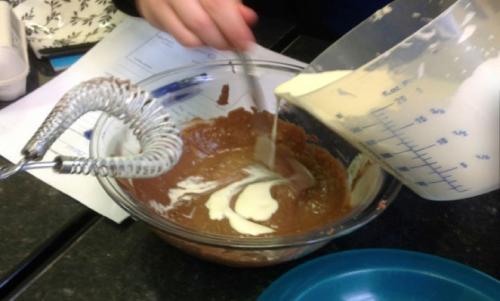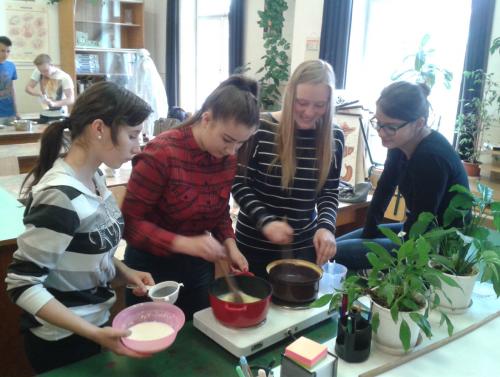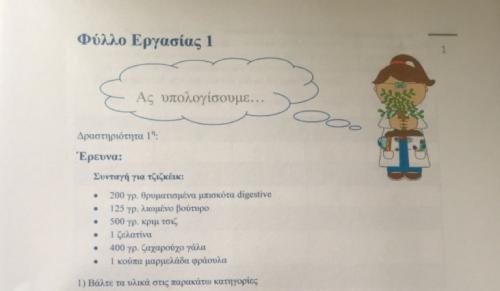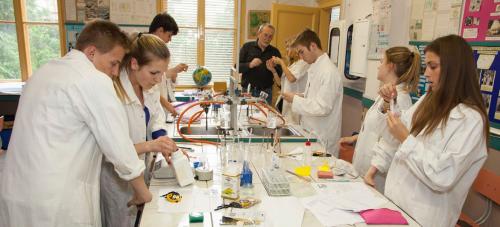The Proof of the Pudding SAILS inquiry and assessment unit outlines an inquiry activity in which the students (plan to) prepare a "good" pudding. This can focus on biological aspects – nutrition, energy content of foods, quality of nutrients, healthy lifestyles – and chemical concepts – groups of organic compounds, colloid systems, and sol gels. The close connection with everyday life and learning based on hands-on activities raise the students' interest. The three activities first introduce the topic, develop into planning and implementing an investigation and end with reflection on new knowledge. These activities can be implemented in two lessons (~90 minutes), but preparation of the pudding takes more time and may be assigned as homework.
Through this activity, students develop their inquiry skills in planning investigations by distinguishing alternatives and constructing models, as well as skills in developing hypotheses, forming coherent arguments – setting variables, handling quantities, making comparisons, making judgements and decisions, analysing and critiquing experiments – and working collaboratively. The assessment opportunities described include student observation, group discussion or presentation and evaluation of student artefacts.
The unit was trialled by teachers in Ireland, Slovakia, Greece and Hungary, with students aged 14-18 years, in five classes in total. The teaching approach in the case studies was generally that of guided inquiry (open inquiry for one Hungarian class). The assessment of planning investigations was carried out in all case studies. In Ireland, Slovakia and Greece, the assessment of forming coherent arguments and working collaboratively is also described.
- Groups of nutrients
- Colloidal systems
- Health nutrition
- Attitudes towards healthy nutrition and lifestyle
- Lower
- Upper
- Planning investigations
- Developing hypotheses
- Forming coherent arguments
- Working collaboratively
- Scientific reasoning
- Scientific literacy
- Classroom dialogue
- Teacher observation
- Peer-assessment
- Self-assessment
- Worksheets
- Student devised materials
- Presentations
- Other assessment items
The Proof of the Pudding SAILS unit was developed as part of the PRIMAS project, http://www.primas-project.eu, within the Seventh Framework Program of the European Union, and adapted for use in the SAILS project. In this unit, students are tasked with the preparation of a “good” pudding. The unit comprises three activities; in the first activity the theoretical concepts underlying the activity are introduced, in the second activity students plan an experiment to test their hypotheses of what makes a good pudding and, finally, the students reflect on what has been learned through the activities.
The depth of prior knowledge for implementing the unit depends on the focus of development. For lower second level, the goal for development can be developing research skills. For upper second level students, an inquiry into the colloid state and systems based on knowledge in the field of chemistry and physics, or having a look into nutrients and the healthy diet is appropriate. It is not a problem if the group does not have prior knowledge of the topic, as seeking information can be a part of the task. However, in all cases, it is important that the students are able to anchor and link the newly acquired information to their existing knowledge and increase their understanding.
When dealing with the unit activities, it is important that the assessment is in line with the objectives of the topic and with the curriculum. It is also important that students know before they commence their work how to report their results and how they will be judged. The draft unit proposed that planning investigations was a key inquiry skill for development during implementation, but opportunities for assessment of other skills and competencies have been identified for each of the unit activities. The students can be assessed, either as groups or as individuals, through the use of discussion and provision of oral formative feedback during the lesson. Assessment can consider student’s concept knowledge, inquiry skills and scientific literacy. In addition, self- and peer-assessment may be carried out. For each of the activities, some suggested skills for assessment and criteria for success are outlined.
The suggested two lesson periods allocated to cover the unit (approximately 90 minutes) are not sufficient to exploit all the possibilities inherent in the task. Students can manage to finish the preparation of the designed end product with sufficient support, but designing them along multiple design aspects and critical analysis of each other’s end products requires more time. Thus, it is suggested that one more period be attached to the unit where possible. This time could be allocated to more detailed analysis (e.g. energy content, composition of nutrients) or a more thorough development of research skills, as well as observation, support and assessment.
Below you can find the full inquiry and assessment unit for download, as well as an archive with classroom materials, including student worksheets and assessment tools for teachers to be used during the activities if available.
Unit booklet| Concept focus |
Introduction of background theory
Features of carbohydrates, proteins, fats and minerals
Nutrition
|
| Inquiry skills focus |
Developing hypotheses
Forming coherent arguments
Working collaboratively
|
| Scientific reasoning |
Identifying problems
Making reasoned decisions
|
| Scientific literacy |
Explaining scientific concepts
|
| Assessment methods |
Classroom dialogue
|
| Concept focus |
Model system for the jelly state
Planning preparation of a “good” pudding
|
| Inquiry skills focus |
Planning investigations
Developing hypotheses
Forming coherent arguments
Working collaboratively
|
| Scientific reasoning |
Making reasoned decisions
|
| Scientific literacy |
Explain colloid state and sol/gel transformation
|
| Assessment methods |
Classroom dialogue
Worksheets
Student devised materials
|
| Concept focus |
Reflection on acquired knowledge
|
| Inquiry skills focus |
Forming coherent arguments
|
| Scientific reasoning |
Drawing conclusions
|
| Scientific literacy |
Presenting scientific data
|
| Assessment methods |
Classroom dialogue
Worksheets
Student devised materials
|
The Proof of the Pudding SAILS inquiry and assessment unit was trialled in four countries, producing four case studies of its implementation – CS1 Ireland, CS2 Slovakia, CS3 Greece, CS4 Hungary. All the case studies were implemented by teachers who had some experience of teaching through inquiry, but the students involved had generally not been taught through inquiry, except for CS3 Greece.
The ages of the students involved in the case studies were 15-16 years old for CS1 Ireland, CS2 Slovakia and CS3 Greece, while in CS4 Hungary the unit was trialled with two classes – one science class of 14-15 year olds and one biology class of 17-18 year olds. In all case studies the students were of mixed ability; CS1 Ireland was the only case study with a single-sex class (all female).
The case studies focus on developing students' skills in planning investigations, forming coherent arguments and working collaboratively. Scientific reasoning capabilities and scientific literacy were also assessed, in particular evaluating skill in forming arguments and transferring knowledge from the model to the real system. A wealth of assessment methods are detailed, in particular classroom dialogue, evaluation of student devised materials – the pudding – and peer- or self-assessment.
The case studies show that, taking the main problem raised by the unit and the teaching recommendations into consideration, the range of applications can be expanded, which is partly due to the multidisciplinary nature of the content. This way, emphasis can be put on either the chemistry or biology parts. The main focus was on biological aspects in CS3 Greece and chemical aspects in CS4 Hungary. The analysis of the problem can be separated into construction of a model and the actual adaptation of the model. Dealing with the first part of the problem develops theoretical and proportional thinking mostly, whereas the second part helps in practical adaptation and encourages combinative and critical thinking. The latter can be used more effectively with groups of students at a higher age. Each case study places a strong emphasis on eliciting students’ preliminary knowledge and focuses them on the task, strengthening their motivation as well as their independent research skills in the process. Each trial was based on group work (or pair work in case of CS2 Slovakia), but these were complemented with homework assignments (CS1 Ireland) and individual research opportunities as well.
No assessment tools were provided in the draft unit, and each of the case studies developed their own strategies for evaluation of inquiry skills. In both CS1 Ireland and CS3 Greece, teachers used rubrics to assess all of the inquiry skills and scientific reasoning and literacy. CS2 Slovakia and CS4 Hungary focused on specific inquiry skills and primarily utilised formative assessment through oral feedback during the lesson. Most case studies included some aspect of peer- or self-assessment, allowing students to engage in and understand the evaluation process.
Below you can find the full inquiry and assessment unit for download (excluding the case studies), as well as an archive containing all the case studies.
Unit booklet Case studies| Concept focus |
Development of inquiry skills
States of matter – gelatine structure
|
| Activities implemented |
Preparation of inquiry
Planning investigations & carrying out the inquiry
Evaluation and feedback
|
| Inquiry skills assessed |
Planning investigations
Forming coherent arguments
Working collaboratively
|
| Scientific reasoning |
Proportional reasoning
|
| Assessment methods |
Classroom dialogue
Teacher observation
Self-assessment
|
| Level |
Upper
|
| Age |
15-16
|
| Prior experience with inquiry |
Some experience
|
| Concept focus |
Transformation of sol-gel
Nutritional balance of proposed recipe
|
| Activities implemented |
Preparation of inquiry
Planning investigations & carrying out the inquiry
Evaluation and feedback
|
| Inquiry skills assessed |
Planning investigations
Forming coherent arguments
Working collaboratively
|
| Scientific reasoning |
Argumentation
|
| Assessment methods |
Classroom dialogue
Teacher observation
Student devised materials
Other assessment items
|
| Level |
Upper
|
| Age |
15-16
|
| Prior experience with inquiry |
No experience
|
| Concept focus |
Nutritional balance of proposed recipe
|
| Activities implemented |
Preparation of inquiry
Planning investigations & carrying out the inquiry
Evaluation and feedback
|
| Inquiry skills assessed |
Planning investigations
Developing hypotheses
Forming coherent arguments
Working collaboratively
|
| Scientific reasoning |
Observing
Making comparisons
|
| Scientific literacy |
Understanding concepts under investigation
|
| Assessment methods |
Classroom dialogue
Teacher observation
Peer-assessment
Self-assessment
Worksheets
Student devised materials
|
| Level |
Lower
|
| Age |
14-15
|
| Prior experience with inquiry |
Some experience
|
| Concept focus |
Construction of a model system
|
| Activities implemented |
Preparation of inquiry
Planning investigations & carrying out the inquiry
Evaluation and feedback
|
| Inquiry skills assessed |
Planning investigations
Forming coherent arguments
|
| Scientific reasoning |
Drawing conclusions
Identification of variables
Transfer of knowledge from model to real system
|
| Assessment methods |
Classroom dialogue
Teacher observation
Peer-assessment
Worksheets
Student devised materials
Presentations
|
| Level |
Lower
Upper
|
| Age |
15-18
|
| Prior experience with inquiry |
Some experience
|




